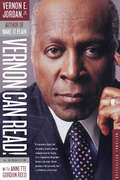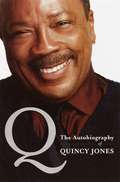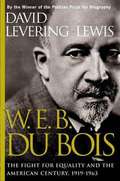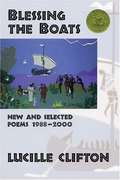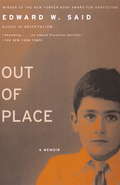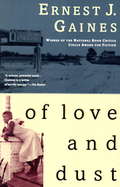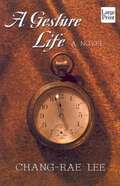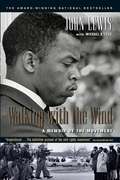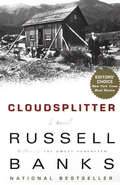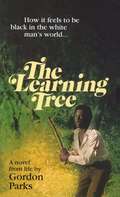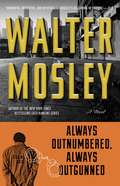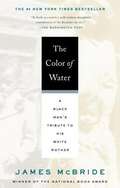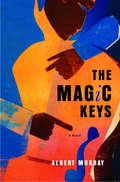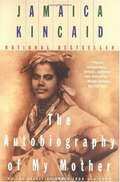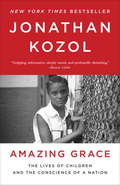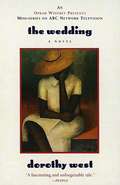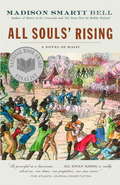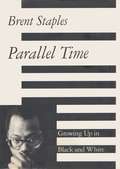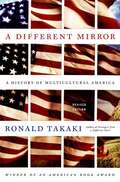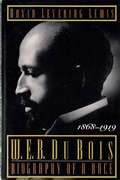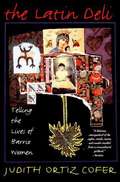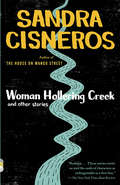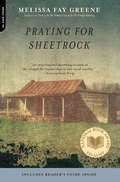Special Collections
Anisfield-Wolf Book Award
Description: The Anisfield-Wolf Book Award recognizes books that make important contributions to understanding racism and help develop an appreciation of the rich diversity of human cultures. #award
- Table View
- List View
Vernon Can Read!
by Annette Gordon-Reed and Vernon JordanAs a young college student in Atlanta, Vernon E. Jordan, Jr. had a summer job driving a white banker around town. During the man's post-luncheon siestas, Jordan passed the time reading books, a fact that astounded his boss. "Vernon can read!" the man exclaimed to his relatives. Nearly fifty years later, Vernon Jordan, now a senior executive at Lazard Freres, long-time civil rights leader, adviser and close friend to presidents and business leaders and one of the most charismatic figures in America, has written an unforgettable book about his life and times. The story of Vernon Jordan's life encompasses the sweeping struggles, changes, and dangers of African-American life in the civil rights revolution of the second half of the twentieth century.
Q
by Quincy JonesQuincy Jones has won multiple grammy awards. He has been acknowledged as a masterful jazz, rock, and funk musician, has created some of the most memorable film scores of the pop era, and has sat at the production controls for numerous landmark albums, including Michael Jackson's Thriller, the biggest-selling long-player of all time.
W.E.B. Du Bois
by David Levering LewisThe second volume of the Pulitzer Prize--winning biography that The Washington Post hailed as "an engrossing masterpiece"
Charismatic, singularly determined, and controversial, W.E.B. Du Bois was a historian, novelist, editor, sociologist, founder of the NAACP, advocate of women's rights, and the premier architect of the Civil Rights movement. His hypnotic voice thunders out of David Levering Lewis's monumental biography like a locomotive under full steam.
This second volume of what is already a classic work begins with the triumphal return from WWI of African American veterans to the shattering reality of racism and lynching even as America discovers the New Negro of literature and art. In stunning detail, Lewis chronicles the little-known political agenda behind the Harlem Renaissance and Du Bois's relentless fight for equality and justice, including his steadfast refusal to allow whites to interpret the aspirations of black America. Seared by the rejection of terrified liberals and the black bourgeoisie during the Communist witch-hunts, Du Bois ended his days in uncompromising exile in newly independent Ghana. In re-creating the turbulent times in which he lived and fought, Lewis restores the inspiring and famed Du Bois to his central place in American history.
Pulitzer Prize Winner
Blessing the Boats
by Lucille CliftonThis long-awaited collection from one of the most distinguished poets working today includes new poems written during the past four years as well as generous selections from previous collections.
Winner of the National Book Award
Out of Place
by Edward W. SaidFrom one of the most important intellectuals of our time comes an extraordinary story of exile and a celebration of an irrecoverable past.
A fatal medical diagnosis in 1991 convinced Edward Said that he should leave a record of where he was born and spent his childhood, and so with this memoir he rediscovers the lost Arab world of his early years in Palestine, Lebanon, and Egypt.
Said writes with great passion and wit about his family and his friends from his birthplace in Jerusalem, schools in Cairo, and summers in the mountains above Beirut, to boarding school and college in the United States, revealing an unimaginable world of rich, colorful characters and exotic eastern landscapes.
Underscoring all is the confusion of identity the young Said experienced as he came to terms with the dissonance of being an American citizen, a Christian and a Palestinian, and, ultimately, an outsider.
Richly detailed, moving, often profound, Out of Place depicts a young man's coming of age and the genesis of a great modern thinker.
Of Love and Dust
by Ernest J. GainesWhen Jim Kelly is put in charge of Marcus, a man alleged to have killed a man, his calm life is completely disrupted. Marcus is not a likable man. He admits to killing a man who he says deserved what he got. But when he begins to question the rules that black people are held to, Jim can't help but begin to respect and admire his courage.
A Gesture Life
by Chang-Rae LeeFranklin Hada has lived for 30 years in Bedley Run, New York. He has been respected and has been able to keep his dark secret. Now his adopted daughter and her son enter his life. Can he keep his respectability or will his life unravel?
Walking with the Wind
by John Lewis and Michael D'OrsoAn eloquent, epic first-hand account of the civil rights movement by a man who lived it-- an American hero whose courage, vision, and dedication helped change history.
Cloudsplitter
by Russell BanksA triumph of the imagination and a masterpiece of modern storytelling, Cloudsplitter is narrated by the enigmatic Owen Brown, last surviving son of America's most famous and still controversial political terrorist and martyr, John Brown. Deeply researched, brilliantly plotted, and peopled with a cast of unforgettable characters both historical and wholly invented, Cloudsplitter is dazzling in its re-creation of the political and social landscape of our history during the years before the Civil War, when slavery was tearing the country apart. But within this broader scope, Russell Banks has given us a riveting, suspenseful, heartbreaking narrative filled with intimate scenes of domestic life, of violence and action in battle, of romance and familial life and death that make the reader feel in astonishing ways what it is like to be alive in that time.
The Learning Tree
by Gordon ParksPhotographer, writer, and composer, Gordon Parks has written a moving, true-to-life novel of growing up as a black man in this country in the 1900s. Hailed by critics and readers alike, The Learning Tree tells the extraordinary journey of a family as they struggle to understand the world around them and leave their mark a world that is better for their having been in it.
Always Outnumbered, Always Outgunned
by Walter Mosley"Mournful, insightful, and mystical...Mosley's best work of fiction." —Elle New York Times bestselling author Walter Mosley introduces us to Socrates Fortlow, an "astonishing character" (Los Angeles Times Book Review) in this acclaimed collection of linked stories."I either committed a crime or had a crime done to me every day I was in jail. Once you go to prison you belong there." Socrates Fortlow has done his time: twenty-seven years for murder and rape, acts forged by his own two rock-breaking hands. Now, he has come home to a new kind of prison: two battered rooms in an abandoned building in Watts. Working a dead-end job at the supermarket and moving perilously close to invisibility, Socrates seeks inner truth and redemption amid the violence and hopelessness of South Central Los Angeles. In fourteen intertwining tales, Socrates grapples with situations that are never easy as he attempts to hold on to a job and offer a lifeline to a young man on his same bloodstained path. In Socrates's battle-scarred wisdom, there is hope of turning the world around in this "powerful, hard-hitting, unrelenting, poignant short fiction" (Booklist).
The Color of Water
by James McbrideWho is Ruth McBride Jordan? A self-declared "light-skinned" woman evasive about her ethnicity, yet steadfast in her love for her twelve black children.
James McBride, journalist, musician, and son, explores his mother's past, as well as his own upbringing and heritage, in a poignant and powerful debut,The Color Of Water: A Black Man's Tribute to His White Mother.
The son of a black minister and a woman who would not admit she was white, James McBride grew up in "orchestrated chaos" with his eleven siblings in the poor, all-black projects of Red Hook, Brooklyn.
"Mommy," a fiercely protective woman with "dark eyes full of pep and fire," herded her brood to Manhattan's free cultural events, sent them off on buses to the best (and mainly Jewish) schools, demanded good grades, and commanded respect.
As a young man, McBride saw his mother as a source of embarrassment, worry, and confusion-and reached thirty before he began to discover the truth about her early life and long-buried pain.
In The Color of Water, McBride retraces his mother's footsteps and, through her searing and spirited voice, recreates her remarkable story. The daughter of a failed itinerant Orthodox rabbi, she was born Rachel Shilsky (actually Ruchel Dwara Zylska) in Poland on April 1, 1921.
Fleeing pogroms, her family emigrated to America and ultimately settled in Suffolk, Virginia, a small town where anti-Semitism and racial tensions ran high.
With candor and immediacy, Ruth describes her parents' loveless marriage; her fragile, handicapped mother; her cruel, sexually-abusive father; and the rest of the family and life she abandoned.
At seventeen, after fleeing Virginia and settling in New York City, Ruth married a black minister and founded the all- black New Brown Memorial Baptist Church in her Red Hook living room. "God is the color of water," Ruth McBride taught her children, firmly convinced that life's blessings and life's values transcend race.
Twice widowed, and continually confronting overwhelming adversity and racism, Ruth's determination, drive and discipline saw her dozen children through college-and most through graduate school.
At age 65, she herself received a degree in social work from Temple University.
Interspersed throughout his mother's compelling narrative, McBride shares candid recollections of his own experiences as a mixed-race child of poverty, his flirtations with drugs and violence, and his eventual self- realization and professional success.
The Color of Water touches readers of all colors as a vivid portrait of growing up, a haunting meditation on race and identity, and a lyrical valentine to a mother from her son.
The Magic Keys
by Albert MurrayIf Gabriel García Márquez had chosen to write about Pakistani immigrants in England, he might have produced a novel as beautiful and devastating asMaps for Lost Lovers. Jugnu and Chanda have disappeared. Like thousands of people all over Enland, they were lovers and living together out of wedlock. To Chanda’s family, however, the disgrace was unforgivable. Perhaps enough so as to warrant murder. As he explores the disappearance and its aftermath through the eyes of Jugnu’s worldly older brother, Shamas, and his devout wife, Kaukab, Nadeem Aslam creates a closely observed and affecting portrait of people whose traditions threaten to bury them alive. The result is a tour de force, intimate, affecting, tragic and suspenseful. From the Trade Paperback edition.
Autobiography Of My Mother
by Jamaica KincaidKincaid's new and long-awaited novel is a powerful and unforgettable story of loss, longing, loving, and survival that resonants with the proud insurgence of the human will. The story of Xuela, whose mother dies at the moment she is born, presents "an indeliable portrait of an angry woman" (New York Times) "most comparable, perhaps, to Camus' The Stranger" (Washington Post Book World).
Amazing Grace
by Jonathan KozolThe author of Savage Inequalities, a New York Times best-seller, and Rachel and Her Children, winner of the Robert F. Kennedy Book Award, tells the stories of a handful of children who have--through the love and support of their families and dedicated community leaders--not yet lost their battle with the perils of life in America's most hopeless, helpless, and dangerous neighborhoods.
The Wedding
by Dorothy WestIn her first novel in forty-seven years, Dorothy West, the last surviving member of the Harlem Renaissance, offers an intimate glimpse into African American middle class.
Set on bucolic Martha's Vineyard in the 1950s,The Weddingtells the story of life in the Oval, a proud, insular community made up of the best and brightest of the East Coast's black bourgeoisie.
Within this inner circle of "blue-vein society," we witness the prominent Coles family gather for the wedding of the loveliest daughter, Shelby, who could have chosen from "a whole area of eligible men of the right colors and the right professions. " Instead, she has fallen in love with and is about to be married to Meade Wyler, a white jazz musician from New York. A shock wave breaks over the Oval as its longtime members grapple with the changing face of its community.
With elegant, luminous prose, Dorothy West crowns her literary career by illustrating one family's struggle to break the shackles of race and class.
All Souls' Rising
by Madison Smartt BellIn this first installment of his epic Haitian trilogy, Madison Smartt Bell brings to life a decisive moment in the history of race, class, and colonialism.
The slave uprising in Haiti was a momentous contribution to the tide of revolution that swept over the Western world at the end of the 1700s.
A brutal rebellion that strove to overturn a vicious system of slavery, the uprising successfully transformed Haiti from a European colony to the world's first Black republic.
From the center of this horrific maelstrom, the heroic figure of Toussaint Louverture-a loyal, literate slave and both a devout Catholic and Vodouisant-emerges as the man who will take the merciless fires of violence and vengeance and forge a revolutionary war fueled by liberty and equality.
Bell assembles a kaleidoscopic portrait of this seminal movement through a tableau of characters that encompass black, white, male, female, rich, poor, free and enslaved.
Pulsing with brilliant detail, All Soul's Rising provides a visceral sense of the pain, terror, confusion, and triumph of revolution.
Parallel Time
by Brent StaplesParallel Time is an evocative memoir that poses universal questions: Where does the family end and the self begin? What do we owe our families, and what do we owe our dreams for ourselves? What part of the past is a gift and what part a shackle?
For Brent Staples there is the added dimension of race: moving from a black world into one largely defined by whites.
The oldest song among nine children, Brent grew up in a small industrial town near Philadelphia.
First a scholarship to a local college and then one for graduate study at the University of Chicago pulled him out of the close family circle.
While he was away, the industries that supported the town failed, and drug dealing rushed in to fill the economic void.
News of arrests and premature deaths among Brent's childhood friends underscored the precariousness of his perch in a world of mostly white achievers. A younger brother became a cocaine dealer and was murdered by one of his "clients."
His death propelled Brent into a reconsideration of his childhood and coming-of-age that offers vivid portraits of family and place, of values that supported and pressures that tore apart, of the appeal and pain of entering a predominantly white world, and of the strengths and vulnerabilities of the black world he grew away from.
A Different Mirror
by Ronald TakakiTakaki (emeritus, ethnic studies, U. of California-Berkeley) takes the perspective of ethnic, racial, and national minorities to recount the history of the US since the founding of the first English colony in 1607. The first edition won an American Book Award in 1993. This second incorporates new passages on Franklin Roosevelt's response to the Holocaust, the influx of Southeast Asian immigrants after the Vietnam War, and people pushed northward by poverty in Mexico.
W. E. B. Du Bois
by David Levering LewisA definitive biography of the African-American author and scholar describes Du Bois's formative years, the evolution of his philosophy, and his roles as a founder of the NAACP and architect of the American civil rights movement.
Pulitzer Prize Winner
The Latin Deli
by Judith Ortiz CoferA community transplanted from what they now view as an island paradise, these Puerto Rican families yearn for the colors and tastes of their former home. As they carve out lives as Americans, their days are filled with drama, success, and sometimes tragedy.
Woman Hollering Creek
by Sandra CisnerosA collection of stories, whose characters give voice to the vibrant and varied life on both sides of the Mexican border. The women in these stories offer tales of pure discovery, filled with moments of infinite and intimate wisdom.
Praying For Sheetrock
by Melissa Fay GreeneFinalist for the 1991 National Book Award and a New York Times Notable book, Praying for Sheetrock is the story of McIntosh County, a small, isolated, and lovely place on the flowery coast of Georgia--and a county where, in the 1970s, the white sheriff still wielded all the power, controlling everything and everybody. Somehow the sweeping changes of the civil rights movement managed to bypass McIntosh entirely. It took one uneducated, unemployed black man, Thurnell Alston, to challenge the sheriff and his courthouse gang--and to change the way of life in this community forever.
